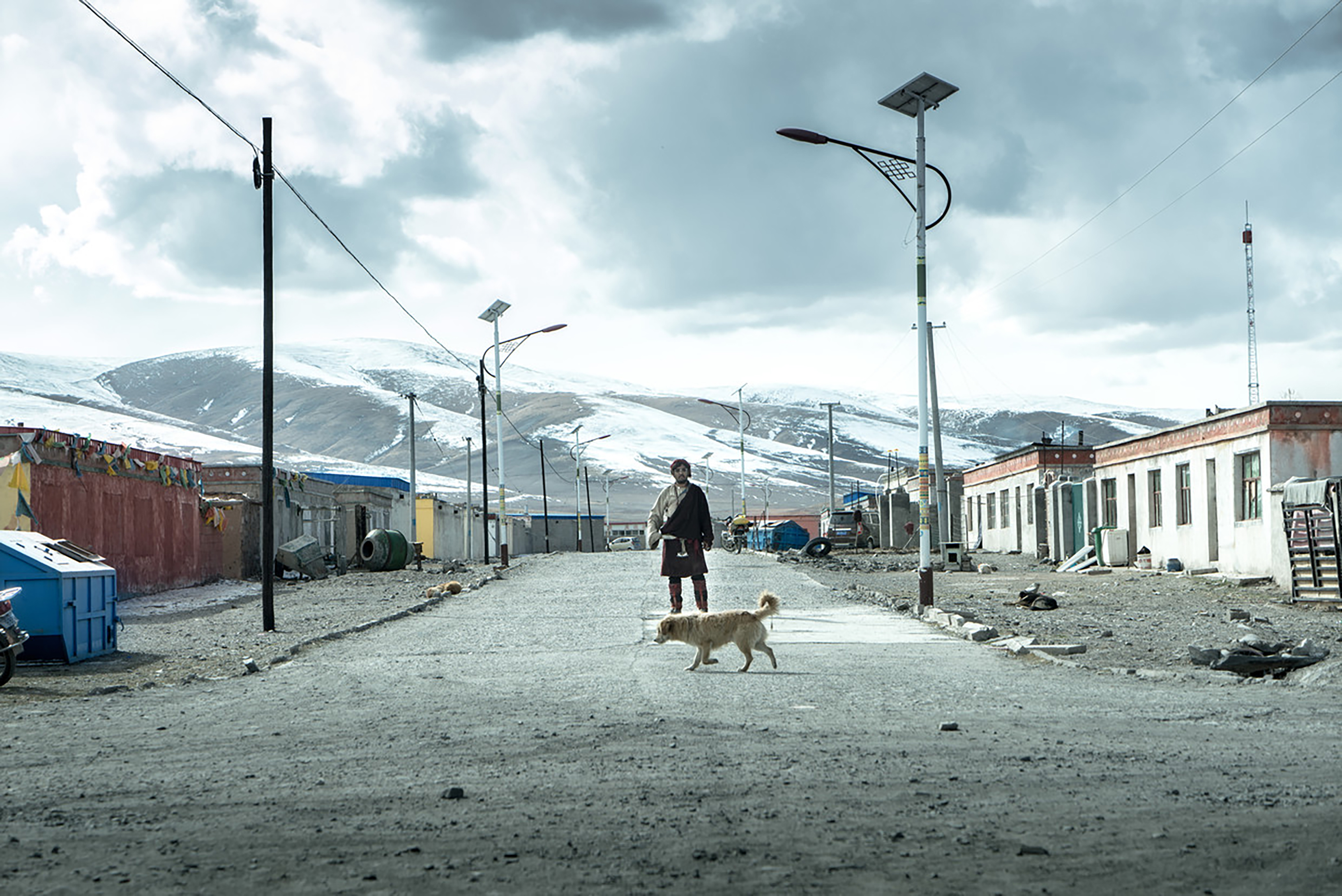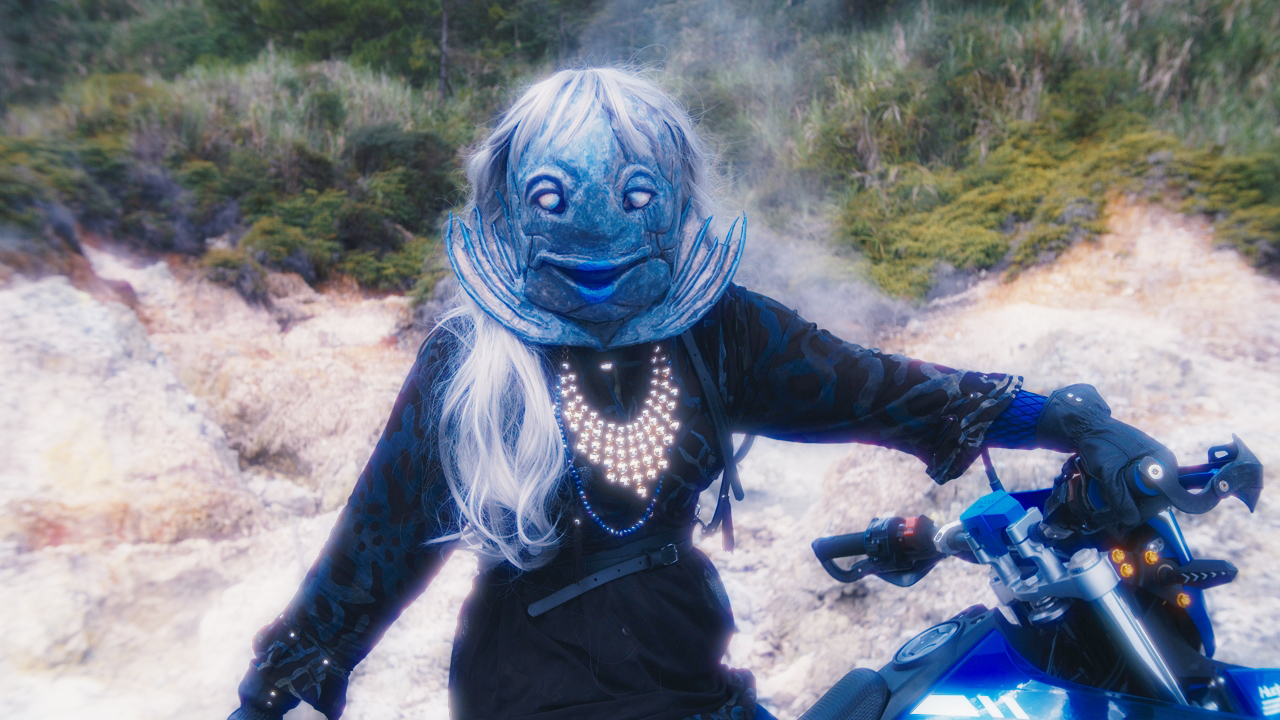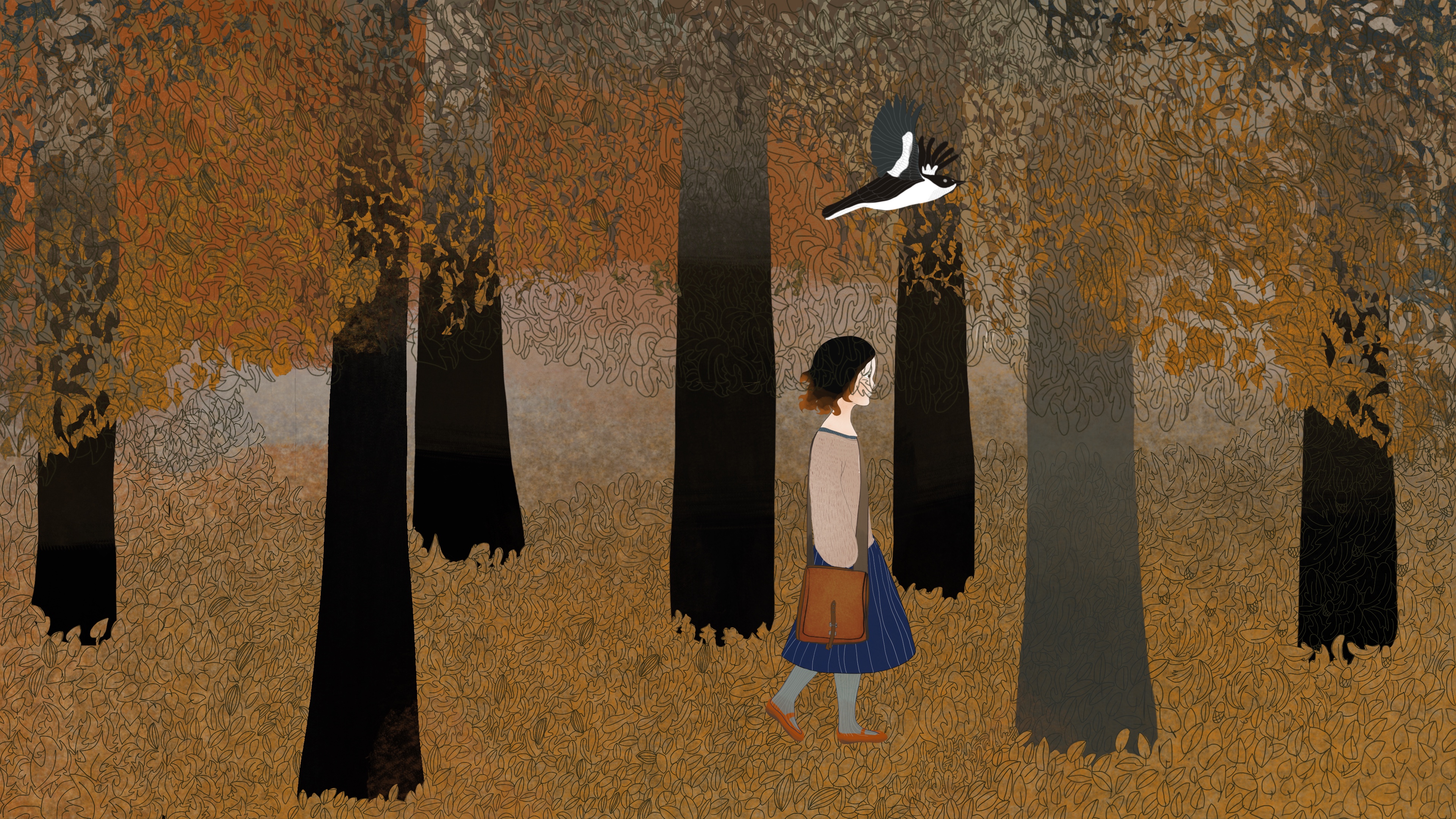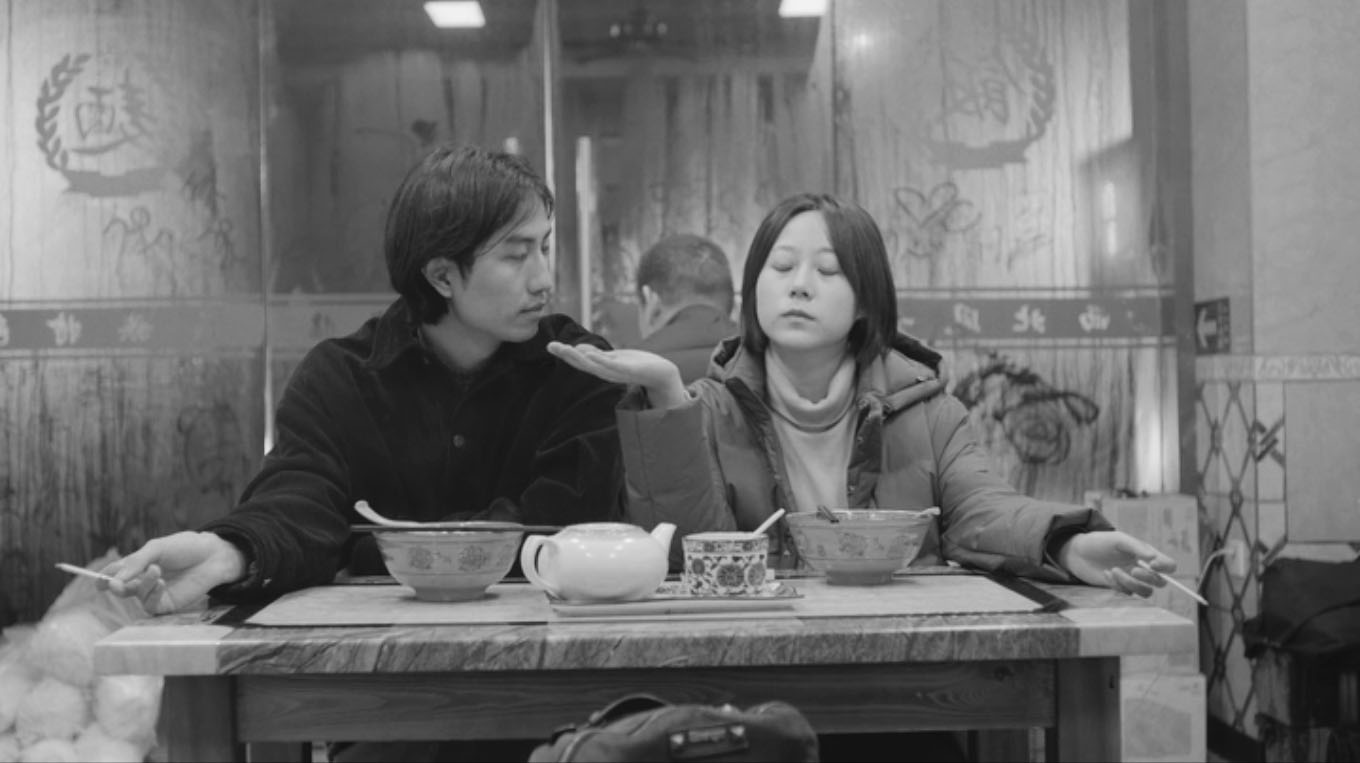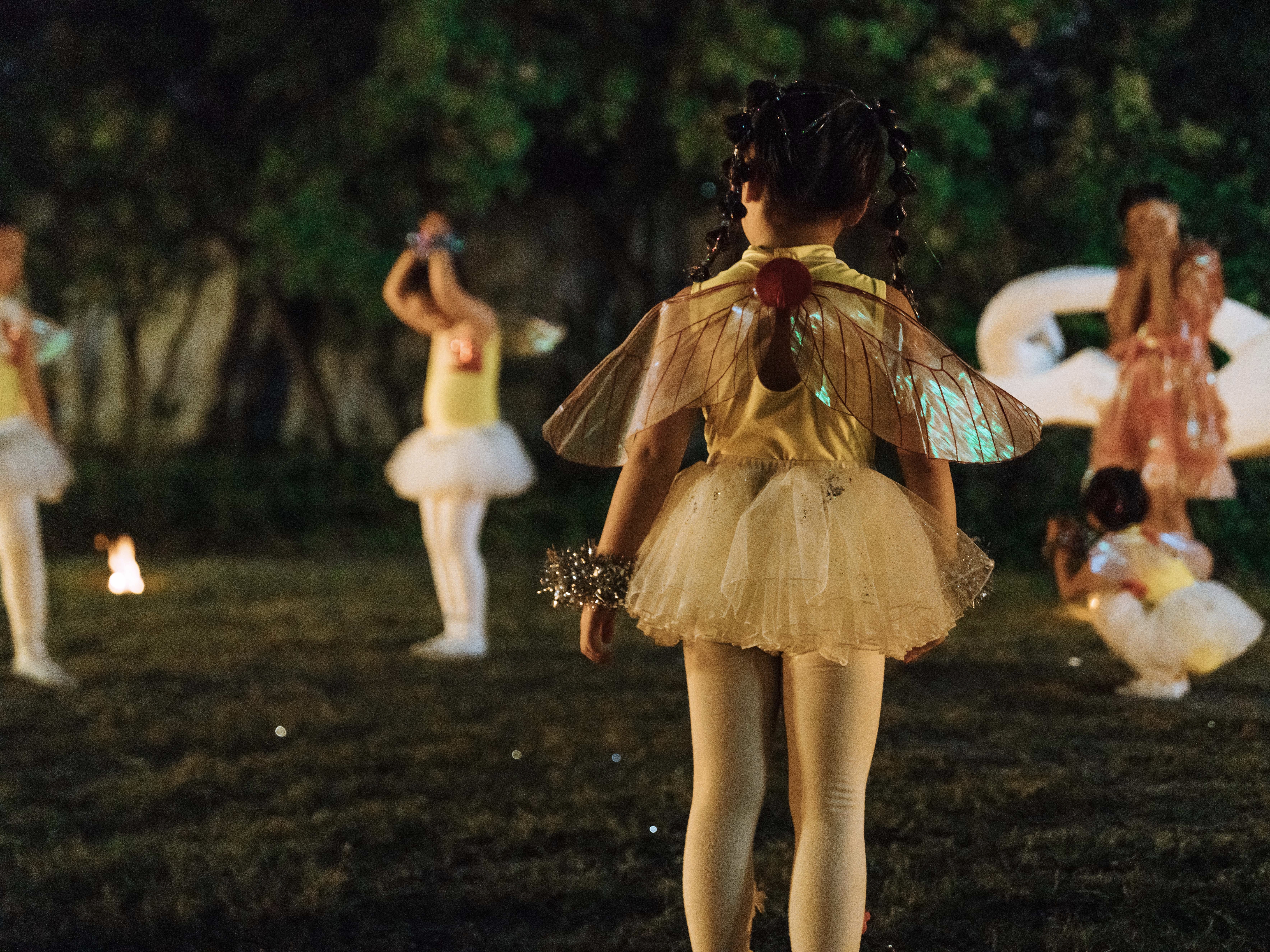Asian Movie Night Winter edition
'Listening Nearby, Through Soils and Seas,' is curated by Akvilė Šlėgerytė and HSIEH I-Hsuan. We are very happy to present an in-depth film program with film screenings, performance-workshop and discussion, focused on Asian indigenous cosmologies, knowledge, and struggle. We curated a selection of films exclusively crafted by indigenous filmmakers or centered around indigenous cultural themes.
In our program, the concept of 'indigenous' transcends a mere ethnic-based approach. Instead, we want to deepen the understanding of diverse ways of livings, foster connections between humans and non-humans, reevaluate conventional notions of time and space, engage in critical reflections on modernity and coloniality, and the interpersonal and interspecies relationships they give rise to.
Inspired by Trinh T. Minh-ha and Fileona Dkhar, with
Listening Nearby, Through Soils and Seas, we hope, not to speak about, for or over, but to listen nearby, to learn from and with nature, to explore and share how multiplicities can weave relations and coexist harmoniously.
Listening nearby, through soils and seas, AMN Seasonal Festival - Winter 2023 will be screened at Limestone Books, Maastricht (08.12), WORM, Rotterdam (10.12), Cavia Amsterdam (16.12) and Focus Arnhem (19.12).
Join us for a
conversation with Anchi LIN at Limestone Books, and for
performance
workshop
The Land in the Middle of the Pond with Anchi Lin, and the
aftermovie conversation with Chautuileo Tranamil (Aralez), Anchi LIN (Ciwas Tahos), Svetlana Romanova and al-yene (from Sata Taas). Moderated by Liang-Kai Yu.
The
performance workshop
QUEERING: The Land in the Middle of the Pond
is based on the Atayal name exchange ritual depicted in the film
The Land in the Middle of the Pond, in which Ciwas and other Atayal women participate. This ritual involves the exchange of names between humans and plants. Ciwas uses this customary practice as a symbolic gesture to reconnect with her ancestral land and affirm her identity in the past, present, and future.
Participants should prepare a plant (even a single leaf, flower, or any other part of a plant) with which they feel a strong connection and would like to engage in an exchange. The artist will introduce her concept, and through the performance, participants will have the opportunity to share their relationship with plants.
RSVP here
Max. 12 people
We will have a
conversation with artists/filmmakers and activists, to reflect on the themes explored in the films, and talk more about the Indigenous struggle, about the ways Indigenous voices are being centred and Indigenous stories are being told through activism and art, and about the Indigenous activism in the Netherlands.
PROGRAM of Limestone Books MaastrichtFriday 08.12.2023
15:00
The Woman Carrying the Prey
16:30
The Catch
19:00
Trilogy: Finding Pathways to Temahahoi (mgluw tuqiy na Temahahoi)+Conversation with artist Anchi LIN (Ciwas Tahos).
Moderated by Liang-Kai Yu.
20:30 end of the event
Limestone BooksPROGRAM of WORM Rotterdam
Sunday 10.12.2023
14:00-15:00 performance workshop by Anchi LIN (Ciwas Tahos)
QUEERING: The Land in the Middle of the Pond
15:20 screening #1
15:20 Introduction
by
Ratu Saraswati
Screening of
The Catch
16:20 break
16:35 Screening of
Garden Amids the Flame and
The Land in the Middle of the Pond
17:10 break
17:30 aftertalk with Chautuileo Tranamil (Aralez), Anchi LIN (Ciwas Tahos), Svetlana Romanova and al-yene (from Sata Taas). Moderated by Liang-Kai Yu.
19:15 screening #2
19:15 Intro by
Yu Shimizu
19:20 Screening of
Ancestral Echoes and
Wells of Despair
19:55 break
20:10 Screening of
The Woman Carrying in the Pray
21:20-22:00 drinks
TICKETS
€12,50 full day pass (€15,- at door)
(RSVP for the workshop/performance, max 12)
WORM
PROGRAM of CAVIA Amsterdam
Saturday 16.12.2023
Screening #1
17:00 introduction
17:05 screening of
Garden Amidst the Flame (2022, 27min);
Ancestral Echoes (2022, 14min);
Wells of Despair (2023, 20min)
18:06 end of the first screening.
Saturday 16.12.2023
Screening #2
19:00 introduction
19:05 screening of
Gaga (2022) by Laha Mebow
20:57 end of screening
TICKETS
€5,- / Cineville card free
Screenings are ticketed seperatelly.
It’s not possible to make reservations. Tickets can be bought at the bar half an hour before the film starts.
CAVIA
PROGRAM of FOCUS ArnhemTuesday 19.12.2023
19:00 introduction
19:05 screening of
Gaga (2022) by Laha Mebow
20:57 end of screening
TICKETS
€11.00 (Korting €9.00, Student €5.00)
Cineville card free
Focus
ABOUT
Anchi LIN (Ciwas Tahos) is a Taipei, Taiwan, raised and based new media and performance Artist of Atayal / Itaṟal and Taiwanese Hō-ló descent. Ciwas's body-centred practice weaves Indigenous Atayal worldview through performance, moving image, cyberspace, ceramics and kinetic installation to claim a self-determined queer space. Following a BFA in Visual Art at Simon Fraser University (Canada), she will complete an MFA in New Media Art at Taipei National University of the Arts (Taiwan). Ciwas's work is an exploration of cultural and gender identity, using her body as a medium to trace their experiences with linguistic and cultural displacement and seek out new queer forms of understanding beyond the hetero-patriarchal status quo.
Chautuileo Tranamil is Mapuche, born in Chile and raised in the Netherlands. Chautuileo was stolen from her family through adoption to be raised in the West with Christian values. She found her mother again when she ran for mayor in her town in Wallmapu. Chautuileo is actively integrating an indigenous perspective into all of her work. She is a political scientist by training, with expertise in Conflict Studies, International Relations and Indigenous Rights. She also has experience in education, in healthcare and she has international work experience in peacebuilding. She is also a co-founder of Aralez, a pan-decolonial network for decolonization, repair and cosmovision. She is currently co-project leader of Indigenous Liberation and is one of the initiators of the Indigenous Manifesto.
Svetlana Romanova (from sata taas) was born in Yakutsk, Russia and studied visual arts in Los Angeles. After returning to Yakutia in 2015, she started working on several film projects about her hometown and regions around it. Her video practice is an investigation of two local indigenous groups that she belongs to - Sakha and Even.
Al-yené (from sata taas) is an artist who was born and raised in the Sakha republic. She works across different media, but mostly with video and poetry. Her practice is focused on continuity, displacement, gaps and absences within cultural memory.
Liang-Kai Yu is an art writer, curator, researcher deeply engaged in queer art histories and intersectional feminist practices. His recent contribution to "Queer Exhibition Histories" (Valiz, 2023) challenges the monumental myth of museum through the notion of queer failure. In 2020, together with Co-exist Exhibition 多元成展 (aka Walking Grass 走路草) and Tsai Ming-Jiun, he co-curated the exhibition "不適者生存? Survival of the Exceptional" at Tainan Art Museum. As one of the board members of Limestone Books Maastricht, Yu is dedicated to amplifying undercommon voices within the art community.
Supported by Gemeenten Arnhem, Prince Bernhard Cultuur Fonds,
Taipei Representative Office in the Netherlands.
The Catch (捕鰻的人)
dir.
HSU Che-chia
/ 2021 / TW, JP, KR / 53’ /
Amis, Taiwanese, Mandarin w/
EN subs
![]()
2021 Short Documentary Competition, Taipei Golden Horse Film Festival
2021 Grand Prize Best Documentary, Best Cinematography, Taipei Film Awards
Every November through February, a group of Indigenous Taiwanese migrant workers sets up camps along the Lanyang River in Yilan County to catch the season's first batch of eel fries. Dan, a member of the Amis tribe, has been coming to the Lanyang River for years to catch eels. But this year is different because his girlfriend, Wusai, will accompany him. With Wusai by Dan's side, the makeshift campsite feels more like home. The story revolves around 'searching for identity and existence' as they embark on a fateful journey of survival, driven by the intertwined fate of humans and eels.
HSU Che-chia was born in Kaohsiung, Taiwan, in 1977. He holds a bachelor's degree in Physics but is passionate about documentaries. He has worked on numerous documentary programs for TV, where he developed his distinctive filmmaking style. His works focus on the mythical narratives in modern society, depicting their contradictions through his poetic cinematic language.
Garden Amidst the Flame
dir.
Natasha Tontey
/ 2022 / ID / 27’ /
Tontemboan, English, Melayu Minahasa w/
EN subs
![]()
2023 Karlovy Vary International Film Festival
Garden Amidst the Flame is a coming-of-age story that delves into the fantasies of a group of young Minahasan girls, set against the backdrop of the rapidly changing social and economic context of northern Sulawesi Island in Indonesia. While researching the Christian-majority Minahasa (or Manado) culture, Natasha Tontey participated in the Karai ritual, which bestows Minahasan warriors with invincibility. Drawing from the artist's experience with Karai, the film seeks to adopt a queer perspective on gender, youth, and ecology. It delicately balances playfulness with disarming naivety, blending cultural traditions (animism meets the Spice Girls), and aims to challenge traditional gender roles and masculinity in Minahasan society.
Natasha Tontey
is a Minahasan artist based between Jakarta and Yogyakarta. Her artistic practice primarily explores the fictional narratives of history and myths surrounding 'manufactured fear.' She observes the possibilities of alternative futures, not from the perspective of major and established institutions but as a subtle and personal struggle of marginalized entities and beings. Her recent exhibitions include a solo show at Auto Italia, London, UK (2022), as well as selected group shows and screenings at the 57th Karlovy Vary International Film Festival (2023), Singapore Biennale (2022), De Stroom Den Haag (2022), and Leeum Museum of Art, Seoul, Korea (2022).
The Land in the Middle of the Pond (水池中的土地)
dir.
Anchi LIN (Ciwas Tahos)
/ 2022 / TW
(Atayal)
/ 8’ /
Atayal w/
EN subs
![]() The Land in the Middle of the Pond
The Land in the Middle of the Pond references the forced displacement of the Atayal Qara community in the 1950s for the construction of the Shimen Reservoir, now Northern Taiwan's primary water source. An elder from the displaced Atayal Qara community narrates their story in the video, highlighting the impact of the diaspora on her people. It was filmed at the Shimen Reservoir during a drought. The artist is shown tracing the veins and blood vessels on her limbs, symbolizing her ancestral bloodline and identity. The film also portrays Ciwas and other Atayal women reenacting the Atayal ritual of name exchange, connecting Ciwas with her ancestral land and affirming her identity across time.
Anchi LIN (Ciwas Tahos) is a Taipei, Taiwan, raised and based new media and performance Artist of Atayal / Itaṟal and Taiwanese Hō-ló descent. Ciwas's body-centred practice weaves Indigenous Atayal worldview through performance, moving image, cyberspace, ceramics and kinetic installation to claim a self-determined queer space. Following a BFA in Visual Art at Simon Fraser University (Canada), she will complete an MFA in New Media Art at Taipei National University of the Arts (Taiwan). Ciwas's work is an exploration of cultural and gender identity, using her body as a medium to trace their experiences with linguistic and cultural displacement and seek out new queer forms of understanding beyond the hetero-patriarchal status quo.
Ancestral Echoes
dir.
Fileona Endoxa Dkhar
/ 2022 / NL, ID (Khasi) / 14’ / Khasi w/ EN subs
![]()
Landscapes are legacies of the places we inherit as home. An indigenous Khasi voice, my voice speaks about the Khasi hill tracks, of the past and the present. In the past, spirits dwelt here. In the present, there are ancestral echoes. Echoes of past belief and error. For the landscape exists, cut up and burnt, as legacy nonetheless.
Fileona Endoxa Dkhar is a Khasi visual artist. Working with themes of ecology, identity and mythology, her work desires to (borrowing words from Trinh T. Minh-ha) not “speak about” identity but to “speak nearby. Her research involves textual and visual elements, that are presented as performances, videos or audio-visual installations.
The Woman Carrying the Prey (揹獵物的女人)
dir.
Rngrang Hungul (YU Hsin-lan)
/ 2022 / TW (Truku) / 69’ / T
ruku, Mandarin w/
EN subs
![]()
This film focuses on Heydi Mijung, the sole female hunter in the Truku tribe. She upholds the ancestral tradition of 'Gaya' and practices the traditional hunting skills of the Truku to maintain the balance of the entire forest with her hunting methods. As winter approaches, Heydi returns to the old hunting grounds with her nephew to retrace the path and inspect the new hunting trails. The film portrays the perseverance and strength of women and delves into the intricate relationship between humans, animals, and ecology. This interdependence gradually develops through the daily practices of the female hunter. Indigenous hunter culture offers a fresh perspective on our connection with nature.
YU Hsin-lan, originally from the Truku tribe, bears the ethnic name
Rngrang Hungul, where Rngrang is her first name, and Hungul is her father's. Rngrang's work is grounded in extensive visual fieldwork and focuses on contemporary issues indigenous people face. She excels in transforming everyday situations and intimate personal experiences of the tribe into creative elements from a woman's perspective, leading discussions on the positioning and methods of reconnecting individuals with traditional culture in contemporary society. Her recent works include "Mgaluk Dowmung, Connecting with Dowmung," "Woman the Hunter," "The Woman Carrying the Prey," and "Mountain Keepers.
Wells of Despair
dir.
Sata Taas Collective
/ 2023 / NL, RU (Sakha) / 20’ / Sakha w/ EN subs
![]() Wells of Despair
Wells of Despair explores the mechanisms of power that have historically and continue to undermine forms of connectedness by suppressing indigenous knowledge systems. Fueled by extractive practices, the land is warped and transformed into a commodity, erasing indigenous worlds through the extinction of traditional ways of life. Sata Taas Collective reflects on the loss of indigenous culture and knowledge systems in Siberia, as seen through the displacement of artifacts in ethnographic museums. By listening to the voices of this loss, Sata Taas traces the shadows of these displaced artifacts and seeks to understand the ruptured relationships caused by the dominant gaze of power structures.
Sata Taas Collective is a non-tangible network of narratives, memories, dreams, speculative fictions, affects, sensibilities and thoughts. The collective is a constellation of 4 Indigenous artists and cultural practitioners from the Sakha Sire and centers around the idea of revitalizing Indigenous ontologies of relationality. Unfolding in the form of temporal-spatial encounters of communal learning, healing, and worlding, sata taas seeks to nurture kinship, solidarity, and exchange among communities beyond the politics of nation-state borders.
GAGA (哈勇家)
dir.
Laha Mebow
/ 2022 / TW / 112’ /
Atayal, Mandarin, Taiwanese w/
EN subs
![]()
2022 Best Director and Supporting Actress, Golden Horse Awards
2022 Best Director, Asian Feature Competition, Singapore IFF
Hayung's family resides in the mist-covered highlands of eastern Taiwan in the fall. Throughout his life, Hayung practices ‘GAGA’, the Atayal people's belief system and way of life. However, after his passing, his sons seem to deviate from the ancestral teachings and become entangled in local politics. Ha-yung's eldest son, Pasang, joins an election campaign despite opposition from his family, which affects the second son, a farmer. After the election campaign, the entire family teeters on the verge of falling apart. As the snow melts, new lives emerge. Can the family stay together and overcome the crisis?
'Gaga' is the latest feature film in
Laha Mebow's 'Atayal Trilogy' and marks her as Taiwan's first indigenous filmmaker who won the best director at the Golden Horse Awards. The film offers a rare and intimate glimpse into the Atayal tribe. Laha's directorial style immediately evokes the work of Japanese masters like Ozu or Kore-eda and Taiwanese new wave director HOU Hsiao-hsien. The film weaves a complex tapestry of drama across three generations, featuring a tumultuous mayoral election, tribal conspiracies, risk-reward gambles, unexpected visitors, and other emotionally charged life challenges, all imbued with divinely tragicomic undertones.
Laha Mebow (b.1975, 陳潔瑤) is an awarded Atayal filmmaker from Nan'ao, Yilan, Taiwan. She had been an assistant director for Taiwanese New Wave directors, including TSAI Ming-liang and CHANG Tso-chi. Laha Mebow has also served as a producer and director at Taiwan Indigenous Television and Da-Ai Television. With extensive experience in the television and film industry, she is the first female indigenous filmmaker in Taiwan to work on fictional films. She also received recognition as one of the '23rd Taiwan Top Ten Outstanding Young Women' for her contributions to promoting aboriginal culture and international exchange.
Laha Mebow's work focuses on indigenous cultures. '
Finding Sayun' (2011, 不一樣的月光), part of her 'Atayal Trilogy,' was the first feature film created by a female indigenous filmmaker in Taiwan. '
Lokah Laqi!' (2016, 只要我長大) received a nomination at the Golden Horse Awards 2016 and won the Grand Prize and Best Director at the Taipei Film Awards 2016. Her latest work, 'GAGA' (2022, 哈勇家), earned her the first indigenous filmmaker to win the Best Director prize at the Golden Horse Awards.
ABOUT
Curators
HSIEH I-Hsuan is a film curator, critic, and practitioner based in Amsterdam and Taipei with an anthropological background. She's been working as a programmer at the Women Make Waves Film Festival Taiwan since 2021. She was the programmer at Taipei Film Festival (2017-2019), program director at Taoyuan Film Festival (2018), a selection committee member for TIDF (2022, 2024) and Taipei Film Festival New Talent Competition (2019-2021). She also served as a jury member for the 2023 Taiwan International Video Art Exhibition. Her curatorial work has been presented at the Eye Filmmuseum, National Palace Museum (TW) - Southern Branch. I-Hsuan is one of the members of the Limestone Books in Maastricht, and co-organizes a collective called dot to dot, for which they learn from archipelagic alliances to shape the world via forms of storytelling. Click here to subscribe for the newsletter of dot to dot.
Akvilė Šlėgerytė is a cultural producer and art worker, based in Rotterdam. She holds BA in Art History and Theory from Vilnius Academy of Arts (Lithuania), and MA in Arts and Society from Utrecht University. She recently worked and assisted with projects such as Aldo Ramo’s solo exhibition Spinning the Spindle towards Pluritopia at A Tale of A Tub (2022), public programming for InScience International Science Film Festival (2021), including a performative lecture and workshop with dr. Adriana Knouf, as well as Rūta Butkutė’s solo exhibition Somersault at (AV17) gallery in Vilnius (2019) and Visits: contemporary sculpture, object and installation exhibitions in public spaces in Vilnius (2019).
